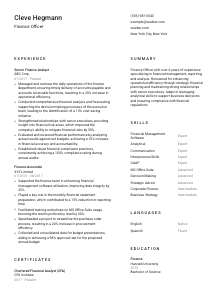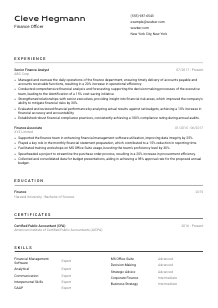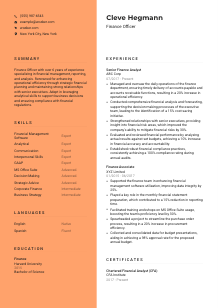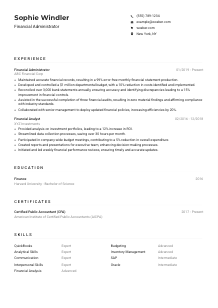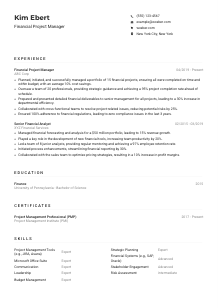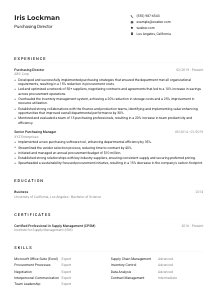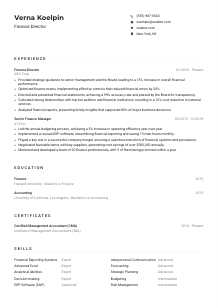Finance Officer Resume Example
Crunching numbers, but your resume seems bankrupt? Dive into this Finance Officer resume example, structured with Wozber free resume builder. Learn how to present your fiscal finesse to align with job expectations, paving your career path as profitably as an investment portfolio!
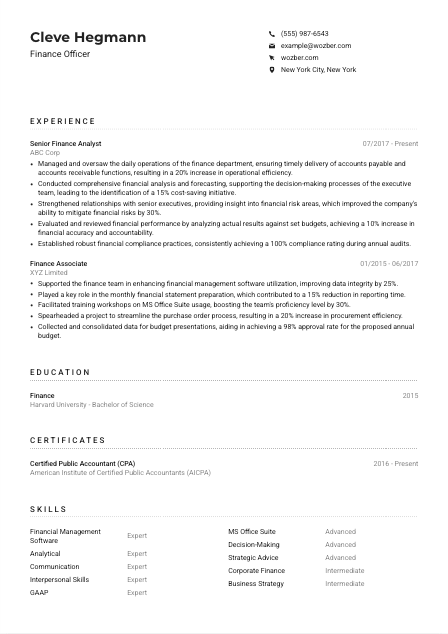
How to write a Finance Officer Resume?
Greetings, aspiring Finance Officer! In the world of finance, standing out is not just advantageous; it's essential. Your resume is more than a mere document. Consider it your personal ledger showcasing your fiscal expertise and achievements.
With the help of Wozber's free resume builder, this guide is meticulously designed to assist you in creating a resume that resonates with the specific demands of your desired role, ensuring it's optimized for Applicant Tracking Systems (ATS) using cutting-edge ATS resume scanner. Embark on this enlightening journey to transform your resume into a key that unlocks your next big opportunity.
Personal Details
The Personal Details section is your resume's front line, setting the stage for your professional persona. Let's meticulously tailor this section for the Finance Officer role, keeping it not only precise but also intriguing for potential employers.
1. Your Name: The Banner
Your name is your headline, the lead in your professional story. Make it memorable with a clear, bold font. This isn't the place for modesty; let your name announce you confidently.
2. Job Title Alignment
Placing the job title "Finance Officer" below your name immediately aligns your resume's intention with the employer's need. This targeted approach begins to weave your narrative into the fabric of the role, making it clear you're not just looking for any job – you're aiming for this one.
3. Contact Information Essentials
Accuracy is crucial. Confirm your phone number and email (professional format preferred) are correct. Embellishments are unnecessary; simplicity speaks volumes here, ensuring you're accessible for interviews and further communication.
4. NYC, Here You Are
Given the job's NYC location requirement, prominently displaying "New York City, New York" in your contact details immediately ticks a vital box for potential employers. It subtly reassures them of your availability and commitment to the role.
5. A Professional Online Persona
Linking a LinkedIn profile can significantly boost your credentials, providing a deeper dive into your professional journey. Ensure it's polished and mirrors the achievements listed on your resume, sealing your professionalism.
Takeaway
The Personal Details section, while seemingly straightforward, is your chance to make a professional entrance. Ensure it's dressed to impress, accurate, and aligned with the role's essentials. Consider this section your business card within the resume – neat, precise, and perfectly tailored.





Experience
The Experience section is the ledger where your professional worth is quantified. Let's ensure your entries here reflect a wealth of relevance to the Finance Officer's role.
- Managed and oversaw the daily operations of the finance department, ensuring timely delivery of accounts payable and accounts receivable functions, resulting in a 20% increase in operational efficiency.
- Conducted comprehensive financial analysis and forecasting, supporting the decision‑making processes of the executive team, leading to the identification of a 15% cost‑saving initiative.
- Strengthened relationships with senior executives, providing insight into financial risk areas, which improved the company's ability to mitigate financial risks by 30%.
- Evaluated and reviewed financial performance by analyzing actual results against set budgets, achieving a 10% increase in financial accuracy and accountability.
- Established robust financial compliance practices, consistently achieving a 100% compliance rating during annual audits.
- Supported the finance team in enhancing financial management software utilization, improving data integrity by 25%.
- Played a key role in the monthly financial statement preparation, which contributed to a 15% reduction in reporting time.
- Facilitated training workshops on MS Office Suite usage, boosting the team's proficiency level by 30%.
- Spearheaded a project to streamline the purchase order process, resulting in a 20% increase in procurement efficiency.
- Collected and consolidated data for budget presentations, aiding in achieving a 98% approval rate for the proposed annual budget.
1. Decipher the Job Post
Dive deep into each responsibility and requirement listed in the job description. Highlight phrases like "manage and oversee daily operations" and "conduct financial analysis and forecasting" for targeted reflection in your resume.
2. Positioning Your Roles
List your roles in reverse chronological order, starting with the most recent. For each, include your title, company, and tenure. This structured approach paints a clear picture of your ascending professional narrative.
3. Achievement-Focused Bullet Points
For each role, craft bullet points that mirror responsibilities from the job description with your accomplishments. For instance, "Managed and oversaw the daily operations of the finance department" directly responds to the job's needs with proof of your capability.
4. Add Numbers to Your Story
Quantify your achievements where possible. Mentioning a "20% increase in operational efficiency" or a "15% cost-saving initiative" offers a tangible measure of your impact, making your contributions undeniably valuable.
5. Relevance is Key
Keep your content focused. Ensure every bullet point makes a case for your fit for the Finance Officer role. Extraneous details dilute your message, while precision sharpens it.
Takeaway
Your Experience section is the portfolio of your professional achievements. Think of it as your career in numbers and narratives, each bullet point a testament to your suitability and excellence for the Finance Officer role. This section is your proof of concept; ensure it's compelling and directly aligned with what the hiring manager is seeking.
Education
While straightforward, the Education section holds substantial value, underpinning your technical knowledge base. Let's tailor this section to highlight your readiness for the Finance Officer position.
1. Identify the Educational Blueprint
Pinpoint the degree or field of study the job description emphasizes, such as a "Bachelor's degree in Finance, Accounting, or a related field." Make sure your education matches these prerequisites to build instant relevance.
2. Structure for Clarity
Maintain a clean format: degree title, field of study, institution, and graduation year. This straightforward presentation allows easy verification of your educational background, ensuring every detail is accounted for.
3. Degree Resonance
If you possess the exact degree mentioned, such as a "Bachelor of Science in Finance," spotlight it. This direct match can significantly elevate your resume in the selection process, affirming you have the foundational knowledge required.
4. Coursework and Achievements
While not always necessary, highlighting specific courses or academic achievements related to the finance sector can provide an edge, showcasing a deeper specialization or commitment to your field.
5. Beyond the Degree
If relevant, include honors, clubs, or projects that demonstrate leadership or a deeper involvement in your field. These details offer a fuller picture of your capability and passion for finance.
Takeaway
The Education section is more than a formality; it's the bedrock of your professional expertise. Ensure it serves as a solid foundation, clearly aligning with the role's requirements. Your educational background should underscore your readiness and aptitude for the Finance Officer position.
Certificates
Certifications can bolster your resume, offering hard evidence of your skills and dedication. Let's align your certificates with the job's preferences to underscore your qualifications.
1. Match Job Preferences
Recall the job's mention of "Certified Public Accountant (CPA) or Chartered Financial Analyst (CFA) designation preferred." If you hold these, they should be prominently listed, showcasing your specialized expertise and commitment to your profession.
2. Selective Listing
Focus on certifications that directly enhance your candidacy for the Finance Officer role. This isn't the place for an exhaustive list but rather a strategic selection that speaks to your fit and readiness for the position.
3. Date and Detail
For each certification, include the issuing organization and the date of attainment. This detail provides context and validates your achievement, demonstrating your ongoing commitment to professional development.
4. Stay Current
The finance world evolves rapidly; ensure your certifications are up-to-date, reflecting your expertise in current practices and standards. Regular updates to your certifications signal a commitment to excellence and continuous learning.
Takeaway
Certifications are more than accolades; they're proof of your dedication to your craft. Carefully chosen and presented, they can significantly strengthen your application, demonstrating your specialized knowledge and ongoing commitment to professional growth. Make sure these gems are polished and properly showcased on your resume.
Skills
The Skills section acts as a quick reference to your professional toolkit. Let's curate this section to make a compelling argument for your suitability for the Finance Officer role.
1. Decode and Match
Start by itemizing the skills mentioned in the job description, such as expertise in "financial management software" and "strong analytical skills." Align your own skills with these requirements to ensure you're speaking their language.
2. Prioritize and List
Select skills that most directly impact the Finance Officer role. This isn't about quantity but quality, ensuring each skill listed underscores your capability and potential contribution.
3. Organize for Impact
Keep this section neatly categorized between technical and soft skills. This organization helps hiring managers quickly grasp your comprehensive skill set, marking you as a well-rounded candidate.
Takeaway
Your skills section is your professional highlight reel, showcasing the depth and breadth of your capability. Curate this section with care, reflecting the most relevant and impressive skills. This is your chance to prove, at a glance, that your toolkit isn't just full but precisely what the Finance Officer role requires.
Languages
In the interconnected world of finance, language skills can set you apart. Let's align this section with the job's needs while showcasing your linguistic strengths.
1. Language Requirements
Review the job description for language requirements. The specified need for "strong English speaking and writing abilities" should take precedence in this section, noted as your native or fluent language.
2. Highlight Your Linguistic Range
After English, list any additional languages you speak. This diversity showcases your ability to communicate in a global marketplace, potentially giving you an edge in the increasingly globalized world of finance.
3. Clearly Define Proficiency
Be transparent about your level of language proficiency, whether it's native, fluent, intermediate, or basic. This honesty provides a clear understanding of your communication capabilities.
4. Every Language is an Asset
Don't hesitate to list languages even if they weren't mentioned in the job description. Each language is a testament to your adaptability and readiness to engage in diverse environments.
5. Global Perspective
Consider how your language skills could be particularly relevant if the role has an international dimension. Multilingual abilities speak to your capability to navigate and bridge cultures – a valuable asset in any finance role.
Takeaway
Your linguistic skills are more than just personal achievements; they're professional tools that enhance your ability to communicate and connect in an increasingly global industry. Flaunt your languages with confidence, viewing them as integral components of your finance toolkit. Ready to engage with the world, your linguistic prowess could be the key that unlocks new professional doors.
Summary
A compelling Summary is your resume's opening argument, setting the tone for the narrative to follow. Let's craft a summary that positions you as the ideal candidate for the Finance Officer role.
1. Absorb the Job Essence
Begin by immersing yourself in the job description. Understand the critical needs and how your skills and experiences make you the ideal candidate to meet those needs.
2. Introduction with Impact
Start with a strong statement about your professional identity, such as your overall experience in financial management. This hooks the reader, compelling them to learn more about your candidacy.
3. Showcase Relevant Achievements
Briefly highlight a few of your most pertinent accomplishments that tie directly back to the job's requirements. Your ability to foresee financial trends and optimize operational efficiency, for example, positions you as a prime candidate.
4. Brevity with Brilliance
Keep your summary concise and focused. This isn't the place for your entire professional story but a teaser that piques interest and promises value.
Takeaway
Your summary is the handshake before the conversation, the pitch before the purchase. Craft it to capture the essence of your professional identity and its perfect alignment with the Finance Officer role. In just a few lines, you have the chance to assure hiring managers that their search might well be over – with you as the solution. Solidify this first impression with precision, and let it pave the way for your resume's detailed narrative.
Launching Your Finance Officer Journey
Congratulations on crafting a Finance Officer resume that doesn't just pass the scrutiny of an ATS but stands out to human eyes as well. With these detailed, job-specific insights, your resume is not just optimized; it's targeted, compelling, and ready to open doors. Remember, your resume is a dynamic document; as your career progresses, revisit and refine it with Wozber's free resume builder, incorporating ATS-friendly resume template and ATS optimization tools. Your professional journey as a Finance Officer is brimming with potential – let your resume be the map that guides you to your next destination!

- Bachelor's degree in Finance, Accounting, or a related field.
- Minimum of 3 years' experience in a finance or accounting role.
- Proficient in financial management software and MS Office Suite.
- Strong analytical, communication, and interpersonal skills.
- Certified Public Accountant (CPA) or Chartered Financial Analyst (CFA) designation preferred.
- Strong English speaking and writing abilities required.
- Must be located in New York City, New York.
- Manage and oversee the daily operations of the finance department, including accounts payable, accounts receivable, and general ledger activities.
- Conduct regular financial analysis and forecasting to support business decision-making processes.
- Ensure compliance with financial regulations and standards including GAAP.
- Establish and maintain strong relationships with senior executives to identify financial risks and provide strategic advice.
- Evaluate financial performance by comparing and analyzing actual results with forecasts and budgets.





